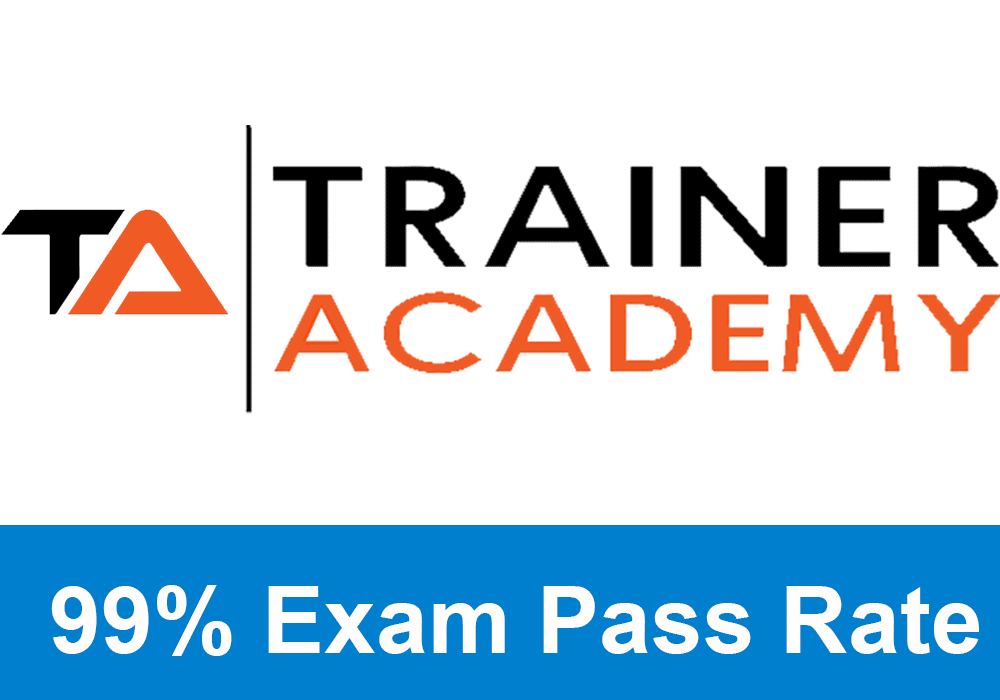Starting a career as a certified personal trainer may seem daunting. With our roadmap to success, you’ll quickly be on your way to your first paying client.
So you’ve decided you want to become a certified personal trainer. Congratulations on making the first step toward joining the allied health profession and making a key difference in the lives of many.
Whether you already have some fitness industry experience or are making a complete career swap, you might feel overwhelmed by the process required to become a personal trainer. Don’t sweat it: This guide shows you step-by-step how to get a personal trainer certification.
Before we dive in, it must be noted that the importance of a valid personal trainer certification cannot be overstated.
I also highly recommend that you take the quiz and find out which personal trainer certification is best for your career goals.
Although this profession may not be as tightly regulated as that of doctors and dietitians, don’t make the rookie mistake of overlooking proper credentials. Not only will an NCCA-accredited personal trainer certification make you more attractive to potential clients, and provide you with the critical knowledge needed to keep clients safe while helping them reach their goals.
Research the Best Personal Trainer Certification Options
Step one is almost too obvious: Research your education options! There are a lot of certification programs out there, but only a handful represent the best. Learn about the best NCCA-accredited personal trainer certification programs to kick off your new career endeavor.
American Council on Exercise (ACE)
The American Council on Exercise (ACE) is one of the most well-known credentialing agencies in the fitness industry. According to ACE, nearly 100,000 valid ACE-certified professionals are in the workforce today. The ACE-CPT course is NCCA-accredited, which meets third-party standards for sufficient education in the field.
If you pursue an ACE certification, you can expect to spend anywhere from as little as 12 weeks up to a year studying for your exam, depending on your experience level. ACE provides three different study packages: Basic, Plus, and Advantage, each of which provides exam prep materials to varying degrees.
National Academy of Sports Medicine (NASM)
The National Academy of Sports Medicine (NASM) is another NCCA-accredited credentialing agency in the fitness industry. The NASM-CPT course is the industry’s most popular and widely recognized fitness certification, point blank.
This course is great for newcomers and seasoned pros, as it covers everything from the basics of movement science to specialized corrective exercise techniques. Compared to the ACE-CPT course, the NASM option covers more sport-specific information as opposed to leading with general public health in mind.
International Sports Sciences Association (ISSA)
The International Sports Sciences Association (ISSA) is more recently NCCA-accredited than other agencies on this list. ISSA just earned its NCCA accreditation for its CPT certification program in 2021. Don’t let that put you off, though: ISSA did what it took to meet NCCA standards, and we commend the education teams. ISSA is PTPioneer’s top choice when it comes to personal training credentials.
Here’s why: The ISSA Elite Trainer Program includes the main ISSA CPT program, the ISSA Nutrition Coach certification, plus an additional ISSA specialization of your choice. All this comes at a price point under $1,200, which is an unbeatable value. You won’t find this much quality education for this price elsewhere.
Exclusive PTP CPT Offers |
||
|---|---|---|
Most Popular Cert | Best Online NCCA Cert | Best Study Materials |
Gold Standard Cert | A Good Option | Best CPT for you?  |
National Strength and Conditioning Association (NSCA)
Although perhaps better known for its Certified Strength and Conditioning Specialist (CSCS) credential, the National Strength and Conditioning Association (NSCA) has a top-tier CPT course as well.
As you might expect from the agency name, the NSCA-CPT course heavily covers exercise science fundamentals and dives deep into strength science and aerobic conditioning. You may not realize outright that this certification program also does a phenomenal job of covering special populations—it’s a great choice if you want to work with older adults, children, pre- or postpartum women, and/or sport-specific athletes.
American College of Sports Medicine (ACSM)
The American College of Sports Medicine (ACSM) is another well-known name respected by individuals and employers. If you opt for the ACSM-CPT program, prepare to learn about the human body in great detail and memorize a lot of human anatomy and physiology.
A seasoned PT vet will tell you that you don’t need all that Latin jargon in the profession day-to-day—and this is true—but at PTPioneer, we firmly believe that such information can and will help personal trainers design effective exercise programs for a variety of populations.
Determine Your Eligibility
While there are no formal education requirements to become a certified personal trainer, there are some eligibility concerns you’ll want to be aware of as you embark on this journey.
Age Requirements
Across the board, trainers-to-be must be 18 to take a personal trainer exam and officially earn the credential. Even if there’s an exception to the rule, traditional employers—that is, commercial gyms like Planet Fitness, LA Fitness, 24 Hour Fitness, Crunch Fitness, and others—require personal trainers to be 18 years of age to work the floor.
Smaller operations in local markets sometimes allow trainers as young as 16 to work with clients. Still, I wouldn’t recommend counting on that (especially considering you’d be working without a certification since the major credentialing agencies require exam takers to be 18).
Education Requirements
In most cases, there aren’t any formal education requirements to become a certified personal trainer. Of course, you should take it upon yourself to learn as much as you can, but you don’t need a degree or a full CPT course to take a CPT exam.
That is to say: If you think you’ve already got the knowledge it takes to be a successful personal trainer, you can skip the course and pay to take a CPT exam from your chosen agency.
At PTPioneer, we strongly recommend taking a CPT course and then taking the corresponding exam, even if you have an exercise science or related degree. The credential sets you apart in a crowded market, and CPT courses cover things that degrees don’t: namely, behavior change, lifestyle interventions, and motivational interviewing techniques, to name just a few.
CPR/AED Requirements
You must hold a valid adult CPR/AED certification to take the CPT exam for ACE, NASM, ISSA, NSCA, ACSM, and others. In most cases, you can take your CPR/AED course via the Red Cross or American Heart Association. Generally, you’ll need the hands-on portion of the course in addition to the online educational modules. (In our experience, it’s easier to dedicate a weekend to the fully in-person option—trust us, those online modules are hard to sit through.)
Exclusive PTP CPT Offers |
||
|---|---|---|
Most Popular Cert | Best Online NCCA Cert | Best Study Materials |
Gold Standard Cert | A Good Option | Best CPT for you?  |
Complete a Personal Trainer Certification Program
After researching your certification options and verifying your eligibility, it’s time to sign up for and complete a program.
On-Campus Personal Trainer Programs
If you’re in college, about to start college, or simply like the idea of in-person classes better than an online course, it’s worth checking out local on-campus personal trainer programs.
Often, students in exercise science or related programs can take a semester-long in-person course to prepare for a CPT exam—agencies like ACE, NASM, and the NSCA partner with universities to provide a curriculum for these courses.
The drawback to in-person programs is the cost. Going to university isn’t cheap in any sense of the word, so definitely do your research on tuition costs before signing up for classes.
Online Personal Trainer Programs
Thanks to their convenience and cost-effectiveness, online CPT courses are the more popular route. We covered the top five personal trainer certification courses above, but here are some more in-depth resources:
- ACE-CPT Review
- NASM-CPT Review
- ISSA-CPT Review
- NSCA-CPT Review
- ACSM-CPT Review
- Complete Guide to Top Personal Trainer Certifications
- Quiz: Which CPT Cert Is Right For You?
Prepare and Study for the Exam
How you prepare and study for your CPT exam is entirely up to you. Everyone learns differently, so it’s worth your while to figure out what sticks. For example, I love creating and memorizing notecards, but that method is pure torture for some people.
Aside from notecards, other popular study methods include:
- Reading and annotating textbooks
- Completing worksheets
- Taking practice quizzes and exams
- Drafting case studies
- Listening to lectures
- Hands-on practice
It doesn’t matter how you learn as long as you do learn. While evaluating your course options, check out the different packages offered by each agency and select the one with the most valuable tools for your learning style.
Take the Personal Trainer Exam
Congrats (in advance) for making it this far! The day you report to the exam room—assuming you’ve studied, of course—is when all your hard work pays off.
Personal Trainer Exam Content and Format
If you study hard and pay attention during your CPT course, you will be well-prepared for the exam content. While the emphases differ from exam to exam, you can expect to encounter questions about the following topic areas:
- Anatomy and physiology
- Exercise science foundations
- Behavioral change and lifestyle coaching
- Client health and risk screening
- Movement screening and assessments
- Strength training
- Aerobic fitness training
- Special populations
- Personal trainer scope of practice
- Legal and ethical concerns
The format of personal trainer exams is almost always online. You’ll most need to report to a proctored exam room. This might be on a college campus or at a computer lab.
You may have the option to take a virtually proctored exam, in which case you’d take the exam at home, and someone would supervise you via a video platform.
Personal Trainer Exam Registration and Fees
CPT exam fees vary, but you can generally expect to pay a few hundred dollars to sit for the exam. The prices always change, so I recommend staying up-to-date with your certifying body of choice. That said, the exam fee is typically included when you purchase a study package or exam prep course from the certifying agency.
Personal Trainer Exam Preparation Resources
You’ll receive many exam prep materials when you purchase a personal trainer certification course. Not to toot our own horn, but PTPioneer has a robust suite of resources for all of the major certification courses. Take a gander:
- Free ACE-CPT Study Guide
- Free NASM-CPT Study Guide
- Free ACSM-CPT Study Guide
- Free ISSA-CPT Study Guide
- Free NSCA-CPT Study Guide
We also have exam prep guides:
Maintain Your Certification
The journey doesn’t end when you pass your exam! All NCCA-accredited personal training certifying agencies require continuing education to maintain a valid certification. Continuing education (CE) is critical because it ensures that personal trainers stay up-to-date with new exercise science, fitness research, and best practices in the industry.
Personal Trainer Continuing Education Requirements
CE requirements differ from certification to certification. Here’s a look at the “big five” and their continuing education requirements:
- ACE: 2.0 continuing education credits (20 hours of education) every two years, plus CPR/AED
- NASM: 2.0 (20 hours) every two years; 0.1 can be from your CPR/AED recertification
- ISSA: 20 credits (20 hours) every two years, plus CPR/AED
- NSCA: The NSCA has a tiered system wherein the required number of credits changes based on when you obtained your original certification. NSCA follows a three-year cycle and requires that you maintain a valid CPR/AED certification during each three-year cycle.
- ACSM: 45 CECs every three years, plus valid CPR/AED.
Each agency also collects a “recertification fee, ” best described as a processing fee.
If you do not satisfy the recertification requirements within your two- or three-year cycle, you may have to retake, pass, and pay the full exam fee. That’s a good incentive to stay on top of your continuing education!
Personal Trainer Certification Renewal
Your renewal process will reflect the requirements and protocols of your certifying body. In general, here’s how it goes:
- At any point after obtaining your original certification, start taking continuing education credits.
- Self-report your CECs in your personal trainer portal.
- Near the end of your recertification cycle (usually two or three years), submit any required documentation to the certifying body.
- Don’t forget to retake the CPR/AED course, in person or online, depending on the requirements of your certifying agency.
- Pay the recertification fee and wait for approval.
- Get your new, updated certificate in the mail.
- And it begins again!
If your certification lapses, you’ll most likely have to retake the personal trainer exam, so study up!
Wrapping Up: How to Get a Personal Trainer Certification
Although this may seem like a lot of information and a long process at first glance, obtaining your personal trainer certification is not as arduous a task as, say, sitting for a four-year degree. Most people can pass the personal trainer exam and be on their way to a fruitful career in less than one year.
Becoming a personal trainer is a great way to make a career out of helping people and doing something you love daily, and getting your certification is the first step: Whether you have an exercise science degree or not, adding “CPT” behind your name will differentiate you from thousands of unqualified individuals on the Internet and elsewhere.

 Have a question?
Have a question? 


Amanda Capritto
PTPioneer Editorial Integrity
All content published on PTPioneer is checked and reviewed extensively by our staff of experienced personal trainers, nutrition coaches, and other Fitness Experts. This is to make sure that the content you are reading is fact-checked for accuracy, contains up-to-date information, and is relevant. We only add trustworthy citations that you can find at the bottom of each article. You can read more about our editorial integrity here.